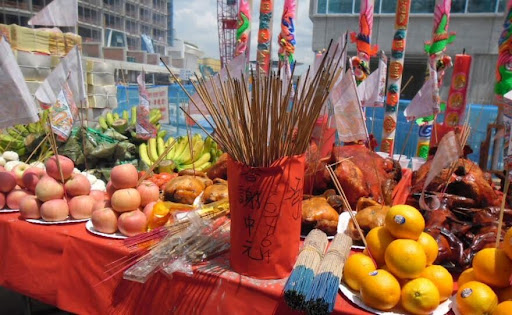Family Friendly Guide to Hungry Ghost Fest
How Can People Participate and Prepare for the Hungry Ghost Festival?
Traditionally, the mid-summer Hungry Ghost Festival falls at the same time as a full moon, the new season, the fall harvest, the return of ancestors, and the gathering of the local community. On the fifteenth day the gates of the afterlife are opened and the spirits of ancestors return to walk amongst the living. These wandering spirits are referred to as “hungry ghosts,” since they’re believed to be restless and in need of comfort.
While some associate the Hungry Ghost Festival with Halloween ” some call the festival Chinese Halloween” the main goal is to honor the dead through spiritual, symbolic and cultural rituals The Hungry Ghost Festival ™s broader message is for people to look after wandering souls (whether a lonely neighbor or a lost spirit roaming the living world), to respect elders, and to value their family. Consider the following meaningful ways to pay homage to your family and ancestors during the Hungry Ghost Festival:
1.Create butterfly puppets According to legend, insects like butterflies, moths, and grasshoppers are believed to be the spirits of ancestors returning for a visit. Pay tribute to these gentle creatures by having your kids create butterfly puppets using craft paper and Popsicle sticks.
2. Hang orange decorations. In Chinese culture, oranges symbolize good luck and wealth and they’re often part of the offerings during the Hungry Ghost Festival. Spruce up your home for the holiday by hanging DIY citrus fruit decorations made from paper and yarn.
3. Cook up some sticky rice dumplings. png kueh, savory dumplings filled with stir-fried rice, peanuts, garlic, shallots, and more, are often associated with Hungry Ghost festivities. Traditionally dyed in an auspicious pink hue, these dumplings symbolize good fortune and can be presented as offerings to ancestors.
4. Attend community celebrations and performances. Communities will typically stage operas and other types of performances throughout Ghost Month. Just make sure to leave the front row empty, as that row is typically reserved for spirits.
5. Enjoy a family dinner together. Like many traditional Chinese holidays, the Hungry Ghost festivities may include a family dinner. However, unlike other holidays, the focus is less on the symbolism of the food and more about feeding ancestors. Simply enjoying a family meal is a great way to pay tribute (just make sure you set an extra place or two at the table for the departed).
6. Perform an ancestor offering ceremony. It’s tradition to set up a makeshift altar outdoors in order to display offerings for passing ghosts. In addition to joss paper money, joss sticks, and incense, offerings can include uncooked rice, peanuts, candies, raw noodles, fruit, and even bags of salt and sugar. Small cups of tea and rice wine are also appreciated. Those who pay close attention to prayer altars may notice that dishes are accompanied by three bowls of rice, three sets of chopsticks and three cups of Chinese tea or rice wine. They represent the three realms”heaven, earth and the underworld
7. Make offerings of ghost money (jinzhi or mingbi), also known as joss paper or hell banknotes“ printed paper resembling money and decorated with stamps or engraved designs. There are different types of hell banknotes for different categories of spirits, the one offered during Hungry Ghost festival is the silver variety given exclusively to ancestral spirits.
Offering the wrong kind of ghost money can bring bad luck. In addition to burning paper money, it ™s common practice to fold joss paper sheets into the shape of gold or silver ingots, a.k.a. precious metal bars. It’s a fun and easy craft project ” just buy some joss paper sheets and check out a joss paper ingot folding tutorial online to get started.


